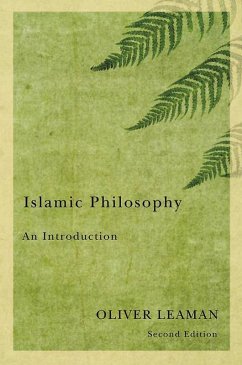Although Islamic philosophy represents one of the leading philosophical traditions in the world, it has only recently begun to receive the attention it deserves in the non-Islamic world. This important text provides a concise and accessible introduction to the major movements, thinkers and concepts within that tradition, from the foundation of Islam to the present day. Ever since the growth of Islam as a religious and political movement, Muslim thinkers have sought to understand the theoretical aspects of their faith by using philosophical concepts. Leaman outlines this history and demonstrates that, although the development of Islamic philosophy is closely linked with Islam itself, its form is not essentially connected to any particular religion, and its leading ideas and arguments are of general philosophical significance. The author illustrates the importance of Islamic thought within philosophy through the use of many modern examples. He describes and contrasts the three main movements in Islamic philosophy ? Peripatetic, Sufi and Illuminationist ? and examines the Persian as well as the Arabic traditions. Wide coverage is given to key aspects of Islamic philosophy, including epistemology, ontology, politics, ethics and philosophy of language, providing readers with a balanced view of the discipline. The second edition has been thoroughly revised and updated throughout, including the addition of two new chapters on recent debates surrounding Islam's need for an enlightenment, and on the future of Islamic philosophy. The new edition of Islamic Philosophy will continue to be essential reading for students and scholars of the subject, as well as anyone wanting to learn more about one of the most significant and influential philosophical traditions in the world today.
"This is a valuable work and would be well suited to survey courseson Islam at the undergraduate level. The author has clearlyenvisaged this, as he has included a copious bibliography andsuggestions for further reading. It is to be hoped that this bookwill be used in this way in universities and colleges which haveprogrammes in Islamic studies and/or religious studies."
Journal of Contemporary Religion
"Leaman does an excellent job of bringing the debates of Islamicphilosophy alive. He takes Islamic philosophy out of the Islamicstudies ghetto and extracts it from antiquarian historicalinterest, making it relevant to everyday philosophical concernswithin the context of our multicultural and multi-faith societytoday."
Sajjad Rizvi, University of Exeter
"Everyone who teaches Islamic philosophy knows that ProfessorLeaman is the gold standard for clear, orderly exposition. This newedition of his Islamic Philosophy will only confirm thatreputation. To those trained only in European and Americanphilosophy, Islamic thought can seem an impenetrable maze of namesand dates, but Professor Leaman clearly lays out the development ofthe ideas in a way that shows their relation to Medieval Europeanthought and, as well as the unique problems Islam (and especiallySufism) brought to philosophy. From the understanding of the natureof the Qur'an, to the importance of God's oneness, to the relationof God to the universe, Professor Leaman guides the reader throughcomplex argument in a way that will reward students of all levelsof expertise. This text is a must for any Islamic Philosophycourse."
Mark Webb, Texas Tech University
Journal of Contemporary Religion
"Leaman does an excellent job of bringing the debates of Islamicphilosophy alive. He takes Islamic philosophy out of the Islamicstudies ghetto and extracts it from antiquarian historicalinterest, making it relevant to everyday philosophical concernswithin the context of our multicultural and multi-faith societytoday."
Sajjad Rizvi, University of Exeter
"Everyone who teaches Islamic philosophy knows that ProfessorLeaman is the gold standard for clear, orderly exposition. This newedition of his Islamic Philosophy will only confirm thatreputation. To those trained only in European and Americanphilosophy, Islamic thought can seem an impenetrable maze of namesand dates, but Professor Leaman clearly lays out the development ofthe ideas in a way that shows their relation to Medieval Europeanthought and, as well as the unique problems Islam (and especiallySufism) brought to philosophy. From the understanding of the natureof the Qur'an, to the importance of God's oneness, to the relationof God to the universe, Professor Leaman guides the reader throughcomplex argument in a way that will reward students of all levelsof expertise. This text is a must for any Islamic Philosophycourse."
Mark Webb, Texas Tech University


